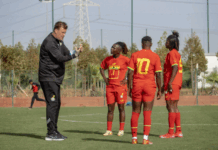Nigeria’s police chief Ibrahim Idris has ordered the immediate removal of all police roadblocks across the country.
Many Nigerians will welcome the news because these roadblocks are often little more than excuses to demand bribes from both ordinary travellers and those transporting goods.
The police statement, however, said the move was intended to reduce time wasted at roadblocks and ease business.
What happens at a roadblock?
Meeting a policeman on the road can be an exhausting experience.
The Ak47 slung casually across his shoulder does little to reassure you about your safety.
More than likely he – and it is invariably a man – would ask you to identify yourself and provide a driving licence.
Then he would ask to check the boot of your car. Next he would verify that you have everything required by law – a fire extinguisher in each car, a warning triangle (C-caution), insurance, roadworthiness certificate and other documentation.
Any omission would lead to the choice of accompanying him to the police station, or an offer to “help you settle it” then and there, (pay a bribe to let you go).
Even if you are up to date on everything, that doesn’t mean you can proceed with your journey.
The officer would subtly ask if you have “anything for the boys”, or point out how hot the weather is (so he needs money for a drink).
This is not a rare occurrence, it is so common that Nigerian comedians often make fun of the police for soliciting bribes.
What not to do at a checkpoint
Receiving calls at a checkpoint can cause further delays.
Security forces generally take offence at people making calls in front of them.
Things could become worse if you try to film proceedings.
They do not take lightly to attempts to record them.
In 2013 police sergeant Chris Omeleze was sacked after a man filmed him trying to collect a bribe at the Lagos international airport. The victim posted the video on YouTube and it soon went viral.
How do you know which is an official roadblock?
There is no clear-cut way to distinguish between a real roadblock and a basic shake-down.
You will most likely see a barrel with the Nigeria police colours – blue, yellow and green – in the middle of the road.
At night a wobbling torch could be the only indicator of a police checkpoint ahead.
If you are unlucky it could also be armed robbers.
While some roadblocks are set up in order to catch criminals, others are merely a money-making scheme for corrupt police officers.
These often spring up at night and weekends.
The police chief has now ordered officers to wear uniforms with their name tags and service numbers visible. So a quick search on the police website could help you identify them and make a report.
How much is a bribe?
Nigeria’s Bureau of Statistics (NBS) 2017 corruption survey said that 32% of adults who had come into contact with public officials had been asked for a bribe.
The NBS says a total of 82 million naira ($230,000; £170,000) was paid in bribes to public officials in Nigeria in the previous 12-month period. This equates to an average of one bribe per person per year.
A typical bribe from motorists would be 20 naira (five cents; four pence).
Worst hit are taxis and trucks transporting goods.
These groups are less likely to challenge authority and are often pressed for time, so they would rather pay a bribe.
A 2013 Transparency International global corruption barometer said that 92% of respondents in Nigeria felt the police were corrupt or extremely corrupt.
Will the roadblock ban succeed?
This is not the first attempt to rid Nigeria’s streets of roadblocks.
In 2012, then police chief Mohammed Dahiru Abubakar made a similar order and more than 3,500 checkpoints were cleared out.
However, they have since found their way back.
This fresh order is another attempt to improve the image of the police.
According to the statement, special “x-squad” teams have been deployed throughout the country to arrest, investigate and discipline any police officer violating the directive.
Every police department must now seek the permission of the inspector general of police to mount roadblocks.
This is just one of the measures that Inspector General Idris has introduced to try and improve the generally negative public image of his force.
But it will take a long time, and concrete evidence of change, before most Nigerians agree with the slogan proudly posted on most police stations: “The police is your friend”.






